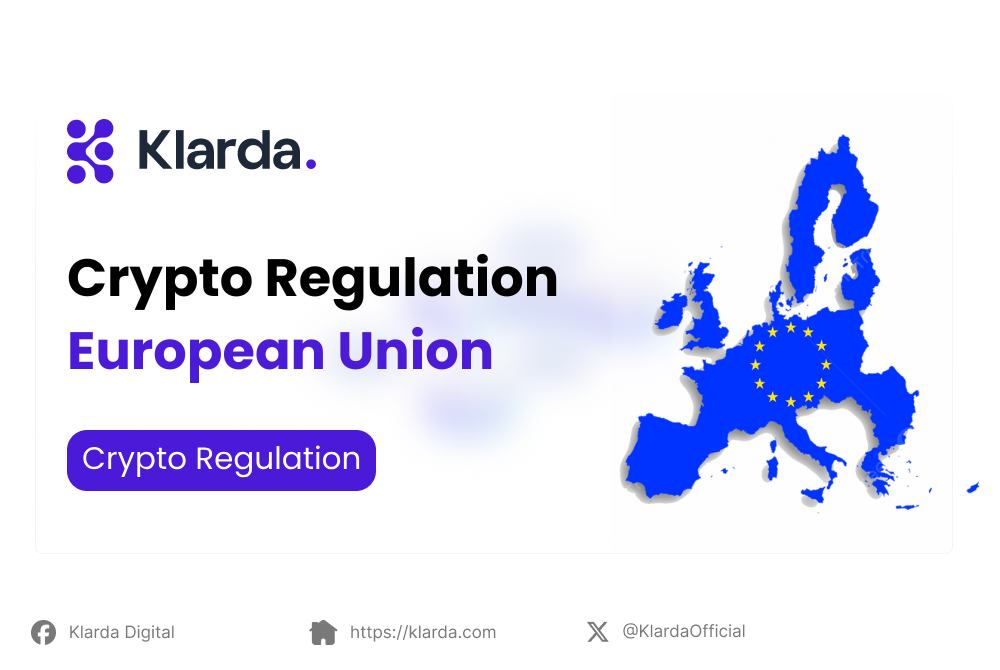Crypto Regulation in European Union (EU)
The significant evolution of EU crypto regulation has experienced modifications over time, adjusting to the rapid growth of the cryptocurrency industry nowadays.
In the complex landscape of cryptocurrencies, the European Union (EU) has sought to establish a comprehensive regulatory framework to govern the use, exchange, and trading of digital assets. This article delves into the realm of "EU Crypto Regulation," exploring its meaning, historical development, establishment, purpose, functioning, and avenues for staying informed in this evolving regulatory landscape.

KEY TAKEAWAYS
- EU crypto regulation encompasses a set of rules and guidelines devised by the European Union to oversee and manage the diverse aspects of cryptocurrencies.
- The establishment of EU crypto regulation has evolved as a response to the rapid growth of the cryptocurrency industry.
- EU crypto regulation is published with several key objectives in mind.he operational aspects of EU crypto regulation involve a comprehensive framework that covers various dimensions, including consumer protection, AML measures, and market integrity.
Staying informed about the latest developments in EU crypto regulation is vital for market participants.
WHAT IS EU CRYPTO REGULATION?
EU crypto regulation encompasses a set of rules and guidelines devised by the European Union to oversee and manage the diverse aspects of cryptocurrencies. Its history is rooted in the acknowledgment of the growing importance of digital assets and the need to establish a unified regulatory approach across EU member states. The benefits of this regulation include fostering market integrity, preventing fraud, and instilling confidence among investors.
Details of EU crypto regulation include some measures:
- Regulatory Authority: The European Union oversees cryptocurrency regulations through various institutions, including the European Commission and regulatory bodies like the European Banking Authority (EBA).
- Legal Status: Cryptocurrencies are not considered legal tender in the EU. However, the EU recognizes them as a form of digital or virtual currency.
- Fifth Anti-Money Laundering Directive (5AMLD): The 5AMLD, implemented in January 2020, extends anti-money laundering (AML) and counter-terrorist financing (CTF) regulations to include cryptocurrency exchanges and wallet providers. This directive aims to enhance transparency and mitigate the risk of financial crimes.
- Registration Requirements: Cryptocurrency exchanges and wallet providers operating in the EU are typically required to register with the appropriate regulatory authorities. Registration ensures compliance with AML and CTF regulations.
- Consumer Protection: EU regulations emphasize consumer protection in the cryptocurrency space. This includes measures to ensure that consumers have access to clear information about the risks associated with cryptocurrencies and the services they use.
- MiCA Regulation: The Markets in Crypto-Assets (MiCA) proposal is a comprehensive regulatory framework aimed at providing legal certainty for crypto-assets. If adopted, MiCA will establish rules for issuers, service providers, and market operators dealing with crypto-assets.
- Prospectus Regulation: The Prospectus Regulation applies to crypto-assets that qualify as transferable securities. It sets out requirements for the issuance and publication of prospectuses for such assets.
- Digital Finance Package: The Digital Finance Package, introduced in September 2020, includes legislative proposals to regulate crypto-assets and promote innovation in the financial sector. It encompasses the MiCA proposal and the Digital Operational Resilience Act (DORA).
- Cross-Border Cooperation: EU regulations encourage cross-border cooperation among member states to address challenges related to the cross-border nature of cryptocurrencies. Consistency in regulatory approaches is sought to create a harmonized framework.
- Future Developments: The regulatory landscape for cryptocurrencies in the EU is expected to evolve further. Ongoing discussions, consultations, and legislative developments will likely shape the future of crypto regulation in the region.
HOW EU CRYPTO REGULATION IS ESTABLISHED?
The establishment of EU crypto regulation has evolved as a response to the rapid growth of the cryptocurrency industry. EU institutions, in collaboration with member states, have worked to create a regulatory framework that addresses the unique challenges posed by digital assets. This process involves consultations, legislative procedures, and a collaborative effort to strike a balance between fostering innovation and safeguarding consumer interests.
WHY EU CRYPTO REGULATION IS PUBLISHED?
EU crypto regulation is published with several key objectives in mind. It aims to provide legal clarity regarding the status of cryptocurrencies, ensuring a consistent understanding across member states. Additionally, the publication of regulations serves to prevent financial crimes such as money laundering and terrorist financing. Regulatory publications are typically issued by EU institutions, including the European Commission and the European Banking Authority.
HOW EU CRYPTO REGULATION WORKS?
The operational aspects of EU crypto regulation involve a comprehensive framework that covers various dimensions, including consumer protection, AML measures, and market integrity. It defines the legal status of cryptocurrencies, outlines compliance obligations for market participants, and establishes mechanisms for enforcement. A detailed understanding of these regulations is crucial for businesses and individuals operating within the EU's crypto space.
WHERE CAN I UPDATE EU CRYPTO REGULATION?
Staying informed about the latest developments in EU crypto regulation is vital for market participants. Official EU websites, such as those of the European Commission and relevant regulatory bodies, serve as primary sources for regulatory updates. Additionally, industry news outlets, legal publications, and announcements from EU institutions offer valuable insights into the evolving regulatory landscape.
As the EU crypto regulation refines its approach to crypto regulation, investors are encouraged to thoroughly investigate and understand the regulatory landscape before entering the cryptocurrency world. Diligent research and staying updated on regulatory changes empower investors to make informed decisions, ensuring a secure and compliant engagement with digital assets within the European Union.
Updated 9 months ago